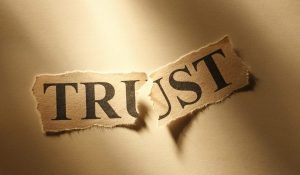
This is a second post on the subject of trust. You can read the first post HERE. As I have read about and pondered trust, I have been reminded of how important trust is to the success of all human interactions. Our current social and political upheaval is a testimony to what happens when trust is lost. I cannot remember a time when there was more distrust among every segment of society than now.
There is a pandemic of mistrust. Currently there are herculean efforts to develop a vaccine for coronavirus which holds promise for an end to the pandemic. Unfortunately, a coronavirus vaccine will not put an end to the distrust pandemic. The coronavirus pandemic, social and political conflict have produced an outbreak of mistrust which has been incubating for decades. Serious as the threat of coronavirus is, the consequences of distrust are even more of a threat to the survival of our society.
“Trust is like blood pressure. It’s silent, vital to good health, and if abused it can be deadly.”– Frank Sonnenberg
If my premise of a pandemic of distrust is correct, a logical conclusion would be that trust building should be a high priority. Accordingly, leadership should be judged on their ability to develop and sustain trust.
It seems the prevailing priority is to achieve agreement. Seeking agreement first puts the cart before the horse. Agreement without trust produces compliance. Only when trust exists will agreement achieve commitment and loyalty which ensures sustainability.
Trust building has long been a part of organizational development. Many are familiar with trust games used in team building.
Who can forget urging your child to jump into your arms, teaching them to trust?
Trust is only as valuable as the object or person trusted.
Definition of trust : reliance on the character, ability, strength, or truth of someone or something
Misplaced trust can as dangerous as distrust, perhaps even more. The saga of cult leader Jim Jones is one tragic example.
Perhaps we can all agree trust is needed. Such agreement ranks right up yet here with “All we need is love”. Trust building, like love, requires hard work. The process of trust building is demanding but rewarding. Neglecting to build trust assures failure. A prerequisite to building trust is answering ; where do we place our trust?
Here are some thoughts and questions I have at this point and will hopefully write about in future posts:
- Trust building must begin on a personal level.
- How is trust built?
- Is Christians’ object of their trust God?
- Where do non-Christians place their trust?
- Is trusting in nothing or no one an alternative?
- What/ who do you count as trustworthy?
“The trust of the innocent is the liar’s most useful tool.”
– Stephen King